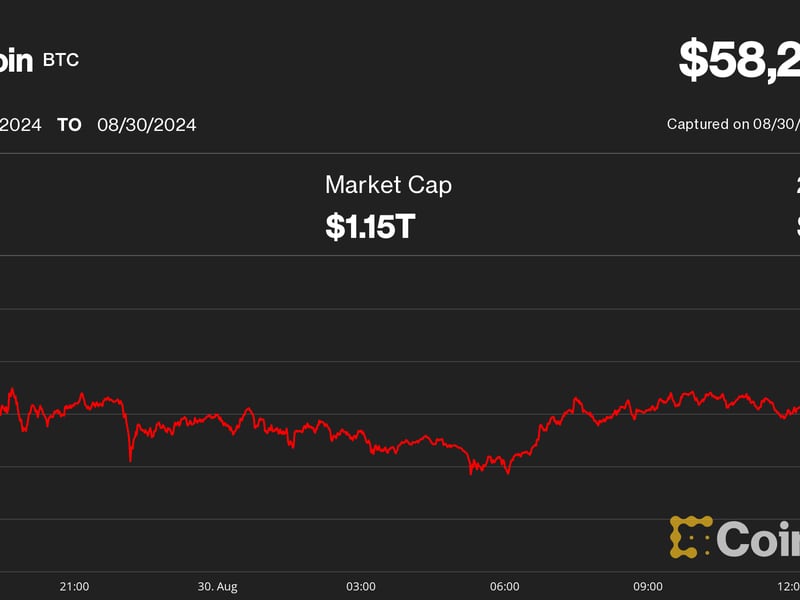Bitcoin’s flat-to-downward price action continued on Friday, with the crypto now lower by 12% in August
There’s been a noticeable pattern of prices rising during Asia trading hours and falling during U.S. hours over the past couple of weeks
Volatility might just return to the upside next week alongside a fresh batch of U.S. economic data
In what’s become a pattern over the past couple of weeks, bitcoin (BTC) is again trending lower during U.S. trading hours, the price sliding back to $58,000 just before noon on the east coast.
Currently at $58,200, bitcoin is down just shy of 4.4% over the past 24 hours, outperforming the broader market gauge CoinDesk 20 Index’s 5.6% decline. Ether (ETH), Chainlink (LINK) and Cardana (ADA) are among the index constituents dropping more than bitcoin. Having the worst session is Solana (SOL) with a 9% decline.
A bit more than 24 hours from the close of August, bitcoin has tumbled more than 12% for the month, more than reversing what had been a strong July. Ether is now lower by 25% for August, narrowing its year-to-date gain to just 7%. Solana is also off 25% for August and posting a 31% year-to-date advance.
Those thinking there’s a familiarity to this lame price action are not imagining things. “Asia bids, America dumps,” wrote Miles Deutscher earlier on Friday. The cumulative return for bitcoin during Asia trading hours over the past two weeks has been more than 5%, according to Deutscher, while the crypto has posted a negative return during U.S. hours.
“Like clockwork,” he added minutes ago as bitcoin once again sold off in the U.S. morning.
The positive catalysts of growing institutional adoption, a possibly friendlier regulatory environment, and coming Federal Reserve rate cuts have done little for the bitcoin price, which is off more than 20% since hitting an all-time high near $73,500 more than five months ago.
Bulls at this point might have a hard time imagining if there’s anything at all that might shake up the poor action. It could get exciting when the U.S. returns from the Labor Day holiday next week, however, as a new wave of economic reports might alter the macro picture.
Headlining the data next week will be the Friday Sept. 6 Nonfarm Payrolls Report for August. The July jobs report was a weak one and likely was the final straw forcing the Fed’s hand in promising a September rate cut. Currently, however, market expectations are for only a meek 25 basis point cut in mid-September. A second consecutive weak jobs print, though, might have investors quickly pricing in a 50 basis point move by the central bank, delivering a strong positive jolt to risk markets, bitcoin among them.
The flip side, of course, would be a strong September employment report and the subsequent tempering of the market’s outlook for easier monetary policy. Whatever happens, volatility likely lies ahead, and there’s probably about a 50% chance it’s to the upside. At this point, the bulls would happily take those odds.

